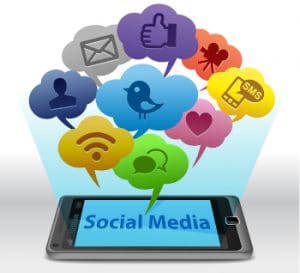Study shows social media isn’t all negative — or positive
 Is social media helpful or harmful to our mental health?
Is social media helpful or harmful to our mental health?
So far, the research has been “contradictory and inconclusive,” according to Mesfin A. Bekalu, Ph.D, a research scientist in the Lee Kum Sheung Center for Health and Happiness at Harvard T.H. Chan School of Public Health.
Bekalu noted that this was his inspiration to conduct a study examining the effects of social media. The study, published in the journal Health Education & Behavior, found a more nuanced response: how individuals used social media had a significant impact on their mental health and social well-being.
“In essence, we found that [it] is not just the use of social media but how one uses it and how you connect with the media is what matters,” said K. “Vish” Viswanath, Ph.D, author of the study, via email.
Viswanath is the Lee Kum Kee Professor of Health Communication in the Department of Social and Behavioral Sciences at the Harvard T. H. Chan School of Public Health.
These findings are “a distinct departure from the dominant discourse on social media,” which has focused so far on “the negative impact of social media rather than on positive mental health,” he said.
Moreover, when measuring social media, studies tend to rely on how often participants use social media, how many accounts they’ve opened, or how many platforms they use. But this doesn’t provide a full picture of social media use.
“We used a different scale, which goes beyond frequency and duration of use,” said Bekalu, lead author of the study.
Specifically, the authors adapted the Social Media Use Integration Scale, which consists of two subscales. The Social Routines subscale features four items: “I enjoy checking my social media account”; “I don’t like to use social media”; “Using social media is part of my everyday routine”; and “I respond to content that others share using social media.”
The second subscale, Social Integration and Emotional Connection, features six items, such as: “I feel disconnected from friends when I have not logged into social media”; “I get upset when I can’t log on to social media”; and “social media play an important role in my social relationships.”
Health and well-being were measured by three scales that examined social well-being; positive mental health (e.g., “In general, I am confident”); and overall health.
Participants were a nationally represented sample of 1,027 American adults surveyed between June and July 2018. Male participants made up 48.5 percent of the sample, while female participants were 51.5 percent.
Findings revealed that routine use was positively associated with all three health-related outcomes, while emotional connection to social media was negatively associated to all three outcomes.
Differences were found across socioeconomic and racial/ethnic population subgroups. The sample consisted of 64.6 percent White, non-Hispanic participants; 11.8 percent Black; 15.8 percent Hispanic; and 8.1 percent Other.
According to Viswanath, “the benefits of social media use seemed to be generally higher among younger, better educated, and the White racial/ethnic groups, whereas the harms seemed to be higher among older, less educated, and minority racial/ethnic groups.”
“This was not surprising to us given what we know from our work on communication inequalities and related health outcomes,” he said.
The authors wrote in their research paper: “These findings are consistent with a growing body of literature on the link between communication inequalities and health that shows that health outcomes could vary across socioeconomic and racial/ethnic population subgroups as a result of differences in motivation for, access to, and use of communication resources.”
Regarding the study’s limitations, Viswanath pointed out that this is one study and only featured an adult sample. “We need to document the effects on different population groups.”
Bekalu noted that because this is a cross-sectional study, “we can’t even speak about causation and effect. This study has brought preliminary evidence and further studies need to build on this and explore it in a rigorous way.”
One potential avenue is a longitudinal design that features two groups of participants (control and experimental) who can be followed for about a year, he said.
“Our work provides an opening on how we can develop potential interventions on how the negative effect of social media use can be mitigated,” said Viswanath. This is vital because social media use is pervasive. According to the Pew Research Center, about seven out of 10 Americans use social media.
Overall, these findings stress the importance of mindfully and intentionally using social media. It’s similar to any technology Bekalu said. “Letting technology control us is problematic. The key is to be in charge of all we do.”
Margarita Tartakovsky, MS, is a Florida-based freelance writer and an associate editor at PsychCentral.com.
